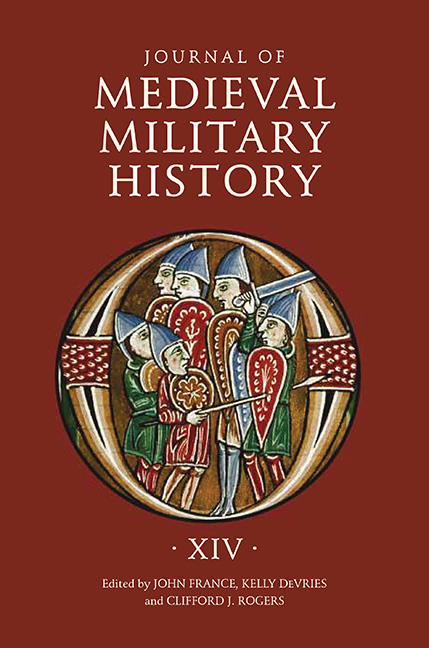Book contents
- Frontmatter
- Contents
- 1 Anglo-Norman Artillery in Narrative Histories, from the Reign of William I to the Minority of Henry III
- 2 Imperial Policy and Military Practice in the Plantagenet Dominions, c. 1337–c. 1453
- 3 The Parliament of the Crown of Aragon as Military Financier in the War of the Two Pedros
- 4 Chasing the Chimera in Spain: Edmund of Langley in Iberia, 1381/82
- 5 Note: A Medieval City under Threat Turns Its Coat, while Hedging Its Bets – Burgos Faces an Invasion in Spring 1366: Introduction and Translation
- 6 Medieval European Mercenaries in North Africa: The Value of Difference
- 7 Medieval Irregular Warfare, c. 1000–1300
- 8 Muslim Responses to Western Intervention: A Comparative Study of the Crusades and Post-2003 Iraq
- 9 “New Wars” and Medieval Warfare: Some Terminological Considerations
- 10 Friend or Foe? The Catalan Company as Proxy Actors in the Aegean and Asia Minor Vacuum
- List of Contributors
- Journal of Medieval Military History
- De Re Militari and the Journal of Medieval Military History
4 - Chasing the Chimera in Spain: Edmund of Langley in Iberia, 1381/82
Published online by Cambridge University Press: 12 September 2017
- Frontmatter
- Contents
- 1 Anglo-Norman Artillery in Narrative Histories, from the Reign of William I to the Minority of Henry III
- 2 Imperial Policy and Military Practice in the Plantagenet Dominions, c. 1337–c. 1453
- 3 The Parliament of the Crown of Aragon as Military Financier in the War of the Two Pedros
- 4 Chasing the Chimera in Spain: Edmund of Langley in Iberia, 1381/82
- 5 Note: A Medieval City under Threat Turns Its Coat, while Hedging Its Bets – Burgos Faces an Invasion in Spring 1366: Introduction and Translation
- 6 Medieval European Mercenaries in North Africa: The Value of Difference
- 7 Medieval Irregular Warfare, c. 1000–1300
- 8 Muslim Responses to Western Intervention: A Comparative Study of the Crusades and Post-2003 Iraq
- 9 “New Wars” and Medieval Warfare: Some Terminological Considerations
- 10 Friend or Foe? The Catalan Company as Proxy Actors in the Aegean and Asia Minor Vacuum
- List of Contributors
- Journal of Medieval Military History
- De Re Militari and the Journal of Medieval Military History
Summary
On 22 June 1381, Edmund of Langley, earl of Cambridge, at the head of a diverse expeditionary force that included English, Castilian, Gascon, and Portuguese elements, set sail from the Devonian ports of Plymouth and Dartmouth bound for Lisbon and eventually the Portuguese frontier with Castile. This expeditionary force was assembled and sent to Iberia as part of John of Gaunt's grand strategy to make good his claim to the Castilian throne. In November 1382 Earl Edmund and what was left of his army returned to England in Castilian ships paid for by his one-time enemy, John I of Castile.
Although contemporary English chroniclers found little to report in regards to the earl of Cambridge's time in Iberia, modern historians, often drawing on Portuguese and Castilian chronicle sources that were critical of the English, have interpreted the Portuguese expedition of 1381/82 as one of the greatest failures of English arms in the middle stages of the Hundred Years War. A number of historians over the last century have devoted attention to Edmund of Langley's time in Portugal. In 1904, Sidney Armitage-Smith argued that the “blundering half-measures of the Government [in London] and [Edmund of Langley's] incompetence,” led to the failure of John of Gaunt's grand strategy. Half a century later, in 1955, Peter Russell argued that the campaign was a complete disaster from the outset, and every aspect of the expedition, from both a Portuguese and an English perspective, was lacking in proper guidance, effective organization and competent leadership. Edmund of Langley, Russell found, not only was possessed of “monumental stupidity” but also displayed “an almost incredible lack of intelligence” in Iberia. More recent scholarship relying less on chronicles and more on documentary evidence has moderated Russell's judgmental opinions, and a number of most recent studies in both English and Portuguese have added to our understanding of this very complex and chaotic time in the Portuguese political world.
In light of more recent studies, this article seeks to reinterpret Edmund of Langley's Iberian campaign in a broader diplomatic and military context, and it will turn on three points. First, that the success of the campaign was compromised at the outset by diplomatic blundering on the part of the principals involved.
- Type
- Chapter
- Information
- Journal of Medieval Military HistoryVolume XIV, pp. 79 - 98Publisher: Boydell & BrewerPrint publication year: 2016



